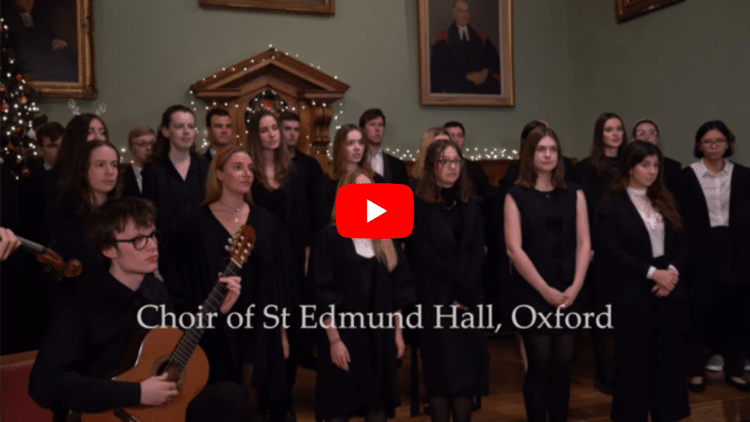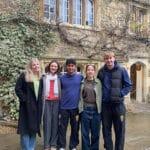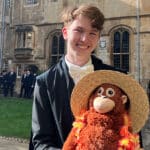New Christmas SEH Choir Video 2022
21 Dec 2022

Shchedryk – on the wings of a swallow from Ukraine
by Viktoriia Khalanchuk (2022, MSt Diplomatic Studies) based on the work of Tina Peresunko, historian and researcher of Ukrainian culture diplomacy, and author of a book about Shchedryk and the Ukrainian Republic Capella
This year, for the first time, the Choir of St Edmund Hall has presented a new version of a song known around the world as ‘Carol of the Bells’, with new lyrics prepared by the Director of Music, Dr James Whitbourn. The new lyrics return the song’s imagery to the original version — the Ukrainian folk song Shchedryk. There are now many versions of Shchedryk and its melody can truly be seen as part of the heritage of humanity. This article presents the history of how the song has become one of the most famous Christmas songs in many parts of the world and an anthem of freedom for Ukraine.
The Ukrainian folk song Shchedryk tells of a swallow who calls for his master to take a look at all the goods he possesses, and predicts a prosperous year ahead. The Ukrainian word ‘shchedryi’ means ‘bountiful’. The original text does not contain any references to Christmas because in Ukraine, Shchedryk is a part of the cycle of spiritual songs for another celebration: the Feast Day of St Melania, called ‘Malanka’ or ‘Shchedryi Vechir’ (Bountiful Evening). Malanka has also become known as the ‘Old New Year’ because St Melania’s Day on January 13 is the New Year in the Julian calendar. In the pre-Christian era, people in Ukraine celebrated the New Year in spring when the swallows returned home after the winter. People blessed one another with ritual songs witnessing the coming of light, celebrating the richness of nature, and wishing for a bountiful year.
Malanka combines pagan and Christian traditions and is actually when Shchedryk and other songs referencing springtime can be heard in Ukraine. These ritual songs are called ‘shchedrivky’, while at Christmas people sing ‘koliadky’, though a list of specific songs varies regionally. These traditions reflect the legacy and mutual enrichment of pre-Christian and Christian motives in Ukrainian culture. Nowadays, the swallow also symbolises God’s bird, which unites heaven and earth, signifies the miracle of God’s Son coming in the human form, and hope for the salvation of humanity. The new lyrics for Shchedryk, written by James Whitbourn, masterfully reveal the original meaning of the song and the new powerful sense brought by Christianity.
The world knows Shchedryk as a Christmas carol thanks to a brilliant Ukrainian composer, Mykola Leontovych. In 1916, Leontovych presented an arrangement of the song. In 1920, the song premiered in London as a part of a world tour by the Ukrainian Republic Capella choir conducted by Oleksandr Koshyts. The Capella was sent abroad by the Ukrainian government to promote awareness of Ukrainian independence in Europe and the Americas on the eve of the Soviet Russia invasion. The Ukrainian National Republic declared independence as a sovereign state in the context of the establishment of the post-World War I order, when the Russian Empire ceased to exist and American President Woodrow Wilson’s ‘Fourteen Points’ were inspiring nations from the Baltics and Eastern Europe with the right to self-determination. However, the young Ukrainian government of that time was not able to secure sovereignty of state in the face of the invading Russian Bilshovyks’ forces and in the context of propaganda claiming that Ukraine had never been a self-sufficient nation. The Ukrainian leadership of that time decided to counter such narratives and seek foreign support through what we would now call cultural diplomacy. The Capella performed numerous concerts in Europe, Canada and the USA. Artists, writers, and politicians from all over the world sent letters in support of the Capella and the Ukrainian National Republic.
In London, the Capella performed twelve concerts from 1 February-1 March 1920 (at Queen’s Hall, Christ Church, Central Hall Westminster, People’s Palace, King’s College and Chiswick Empire Theatre). Shchedryk was included in the programme as a Christmas carol. In Central Hall Westminster, the Capella performed at the meeting of the National Council of Women. At that event, Maria Zarchi, wife of the Counsellor to the Ukrainian Peace Delegation in Paris, gave a speech on behalf of the Ukrainian women’s movement. The Capella also participated in charity performances together with the British Symphony Orchestra. Its farewell concert was performed for blind war veterans in Queen’s Hall followed by several more performances, including a charity concert for the needs of ‘The War Seal Foundation’.
More than one hundred reviews were published in the media after the Capella’s London performances. The British national newspaper The Daily News and Leader wrote that almost all of the songs were performed again as an encore, and Shchedryk and ‘Oy, Tam Za Horoyu’ (‘Oh Over There, Behind the Mountain’), both created by Leontovych, were among the most original and beautiful. While Shchedryk definitely impressed London’s public, the name of the song challenged the British people with difficult pronunciation. The British weekly magazine of humour and satire Punch declared a crisis of a College of Correct Cosmopolitan Pronunciation provoked by the visit of the Ukrainian choir since “at their concert last week several strong women and wept like men at their inability to pronounce the title of one of the most beautiful items on the programme — ‘Shtchedryk’ [sic].”. The illustrated weekly journal The Sketch, in a review of the Capella performances in London, noted: “Not being a believer in so many of the new States which have sprung up since the war, I stood up to the strain of the Ukrainian National Anthem with very mixed feelings. At the end, I was quite convinced as to the justice of their national aspirations — anyway, emotionally.”
The song was also a huge triumph in the USA and became so famed that in 1936 an American conductor of Ukrainian descent, Peter Wilhousky, published a musical score with the new lyrics ‘Carol of the Bells’. For decades, the song has been accompanying the Christmas period under that new title, although the composer, the history behind Shchedryk and even its homeland, geographically the biggest in Europe, had been forgotten and left shrouded in darkness.
Although the Ukrainian government succeeded in cultural diplomacy, it did not receive military support and Ukraine was occupied by Soviet Russia. Composer Mykola Leontovych was killed by the Soviet secret police before the song successfully premiered in Carnegie Hall in the USA in 1922. His death was not investigated before Ukraine restored its independence in 1991 and archive materials become available.
Winter is a dark, cold, and can often feel an endless time of the year. That is literally true in Shchedryk’s homeland now; attacked in the same way as a hundred years ago, by the successor of the Russian and Soviet Empires. Neither Shchedryk, nor any other Ukrainian songs succeeded in preserving the sovereignty of the Ukrainian state in the 1920s. Currently, the Ukrainian Army and all the Ukrainian nation are fighting, with others, for their culture and a home for a swallow to come back to. Military targets apart, Russia is attacking Ukraine’s energy infrastructure and civilian houses, and also missiles and drones have damaged or destroyed cultural property. After the Russian attacks on 23 November 2022, Ukraine experienced large power outages, which immersed the country in almost complete darkness. Instead of scaring people, the darkness has encouraged them, even more, to be strong and struggle for the light in all senses. That fight, however, again needs support.
Although winter is a difficult season in many places in the world, it also presents the brightest wonder for the brave to accept. On the eve of Christmas, Shchedryk highlights the fight for freedom and promises true and God-blessed light after the darkness.
References
- Пересунько, Т. (2019). Культурна дипломатія Симона Петлюри: «Щедрик» проти «русского мира»: місія капели Олександра Кошиця (1919-1924): до 100-річчя європейської прем’єри «Щедрика», до 100-річчя від дня народження Симона Петлюри, до 100-річчя культурної дипломатії України. ‘ArtEk’.
- Ukrainian Institute, ‘The Story of ‘Carol of the Bells’: Celebrating 100 Years of Shchedryk in New York’, https://www.youtube.com/watch?app=desktop&fbclid=IwAR0PzPgLCcBdtO5iGknIIV4hk9hUE7VbhI9MHno0YIywWxGCQqn4D_GQ5hs&v=KKF9sGRV4Vg&feature=youtu.be&ab_channel=UkrainianInstitute [accessed on 28 November 2022].
Categories
Related News

